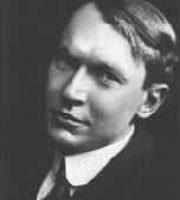About Vachel Lindsay
Vachel Lindsay was an american poet and writer. He is considered as the founder of modern singing poetry, as he referred to it, in which verses are meant to be sung or chanted. He composed his most famous poem 'The Congo' while he traveled on foot from Illinois to New Mexico, exemplified his revolutionary aesthetic of sound for sound's sake. The poem was inspired by a sermon preached in October 1913 that detailed the drowning of a missionary in the Congo River. It imitates the pounding of the drums in the rhythms and in onomatopoeic nonsense words. At parts, the poem ceases to use conventional words when representing the chants of Congo's indigenous people, relying just on sound alone.Because of his identity as a performance artist and his use of American midwestern themes, Lindsay became known in the 1910s as the Prairie Troubador and his fame as a poet grew in the 1910s. Because Harriet Monroe showcased him with two other Illinois poets Carl Sandburg and Edgar Lee Masters, his name became linked to theirs. The success of either of the other two, in turn, seemed to help the third. In 1932, Edgar Lee Masters published an article on modern poetry in The American Mercury that praised Lindsay extensively and wrote a biography of Lindsay in 1935 (four years after its subject's death) entitled 'Vachel Lindsay: A Poet in America'. Lindsay himself indicated in the 1915 preface to 'The Congo' that no less a figure than William Butler Yeats respected his work. Yeats felt they shared a concern for capturing the sound of the primitive and of singing in poetry. In the final 20 years of his life, Lindsay was one of the best known poets in the United States of America. His reputation enabled him to befriend, encourage and mentor other poets, such as Langston Hughes and Sara Teasdale. His poetry, though, lacked elements which encouraged the attention of academic scholarship, and, after his death, he became an obscure figure.
Browse all poems and texts published on Vachel Lindsay
To live in mankind is far more than to live in a name.









